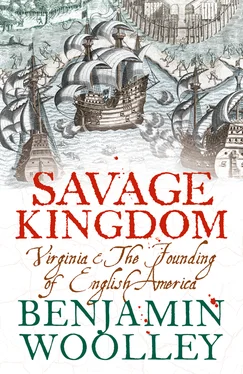A clerk entered the room. He approached the messenger, who handed over the parcel. The clerk broke the wax seal and cursorily glanced at a covering letter, addressed to ‘the Right honourable the Earle of Salisbury of his Majestes privie Councell’. It was from Thomas and Edward Hayes, known to Cecil’s staff as ‘projectors’, agents who tipped off the Secretary of State to speculative schemes that might attract a profit or some political advantage. Attached to the letter was a long, formal document. Its title concerned a controversial subject, and marked it for the Secretary of State’s personal attention. It read: ‘Reasons to move the High Court of Parliament to raise a stock for the maintaining of a colony [in] Virginia’. 2
The word ‘Machiavellian’ came into currency in England in the early 1600s, and it was Robert Cecil who in the minds of many personified its meaning. One of the Earl of Essex’s servants, defending his master before a commission of inquiry called following the Earl’s fall from grace in 1599, described the Secretary of State as ‘an atheist, a Machiavel’ who literally embodied the warped morality of political opportunism. ‘It was an unwholesome thing to meet a man in the morning which hath a wry neck, a crooked back or a splay foot,’ said the servant, referring to various deformities with which Cecil had suffered from birth. 3
Cecil’s cousin and long-time ally Francis Bacon argued that it was these deformities that conferred upon the Secretary of State the callousness and determination a great political operator needs, making him ‘void of natural affection’, and mindful ‘to watch and observe the weakness of others’. 4 These were certainly the qualities he had displayed in his dealings with Sir Walter Raleigh.
Raleigh had been one of Queen Elizabeth’s most cherished, if exasperating, favourites, and in 1584, to demonstrate her affections, she had granted him an exclusive licence to colonize North America. His efforts had resulted in establishing a small settlement on the island of Roanoke, on the Carolina Banks. On this basis he claimed the entire region for the English Crown, naming it ‘Virginia’ in honour of the Virgin Queen. But hostilities with Spain had prevented him from sending supply ships to service the fledgling colony, and in 1590, it was found abandoned, the only clue to the inhabitants’ whereabouts being a word carved in one of the fort’s wooden posts: ‘Croatoan’, the name of a local tribe. Attempts to find the missing settlers came to nothing, and the supply ship had returned to England. 5
Even after 1591, when his licence officially expired, Raleigh had continued to claim Virginia as his, on the basis that his Roanoke settlers may have survived, and established a permanent base elsewhere in the region. But several follow-up missions sent to find his ‘lost colonists’ had proved fruitless. In 1602, a rival mission was dispatched to ‘Norumbega’, in the area of modern-day New England, to find alternative locations for an English colony. Raleigh knew nothing of it until it returned with a lucrative cargo of cedar wood and sassafras (an aromatic bark used to fumigate bedlinen and treat syphilis). His fury at a flagrant attempt to challenge his monopoly over North America resulted in an attempt to confiscate the goods, and an appeal for help and support from his ‘friend’ Cecil. ‘I shall yet live to see [Virginia] an English nation,’ he had promised. But his letter coincided with the final days of Queen Elizabeth’s reign, and Raleigh was emerging as an obstacle to Cecil’s complex manoeuvres to ensure the succession of James VI of Scotland to the English throne.
Elizabeth had died on 24 March 1603, and within days the Scots King took her place as James I of England. Soon after, Cecil confronted Raleigh with accusations that he had attempted to plot against the succession, and had him arrested. Sir Walter was tried for treason, sentenced to death, and thrown in the Tower to await his fate, leaving Virginia conveniently available for the new regime to dispose of as it saw fit.
And now Cecil had in his hands this new proposal for ‘the maintaining of a colony in Virginia’. Thomas and Edward Hayes began in a suitably humble tone: ‘Pardon us (right Honourable), that we presume to move this project presented herewith unto you, so remote from the course of your great affairs as America is from England.’ These ‘great affairs’ were the knock-on effects of the Gunpowder Plot, an attempt by a group of disaffected Catholic gentlemen to blow up the House of Commons on 5 November 1605, the day the King and his entire Privy Council, together with most of the English nobility, had assembled at Westminster for the start of a new session of Parliament. Cecil was leading the official investigation into the plot, which was conveniently sweeping up a great many opponents of the new regime.
In their proposal, the Hayeses argued that ‘so great a business’ as colonizing America ‘can never ever be duly effected by private means’, as previous experience had shown. So they and certain associates had ‘devised another way, where by the cause may be completely set forward’: a great public scheme performed under the auspices of Parliament. 6
Attached to the letter was the motion they intended to be set before the Houses of Parliament. It proposed setting up a large fleet of modern, well-armed and well-equipped ships manned by ‘able Mariners, and worthy chieftains’, which would be sent across the Atlantic to conquer North America in the King’s name. It would be publicly financed, as ‘private purses are cold comfort to adventurers and have ever been found fatal to all enterprises hereunto undertaken by the English, by reason of delays, jealousies and unwillingness to back that project which succeeded not in the first attempt’.
A model for such an undertaking could be found, the Hayeses believed, in the Low Countries. This collection of mostly Protestant city states, dominions of the Spanish Crown fighting for their independence, had created Europe’s most advanced trading region. They had ‘effected marvellous matters in traffic [trade] and navigation in few years’ by financing their expeditions through the issue of ‘main’ or public stock. In contrast, the English strategy of giving a grandee such as Raleigh a monopoly of trade with a particular region had resulted in failure. ‘It is honourable for a state rather to back an exploit by public consent than by private monopoly,’ the Hayeses concluded.
They therefore proposed that the King should give his assent to an Act of Parliament to authorize the setting up of a public company to colonize America. This was a matter of urgency, as ‘the want of our fresh and present supply of our discoveries [in Virginia] hath in manner taken away the title which the law of nations giveth us’ – in other words, use it or lose it.
Cecil was aware of the urgency, as well as the economic advantages, of a colonial venture. Spain’s enormous wealth, after all, rested upon her speculative ventures in South America, which were now profiting the new Spanish King Philip III to the tune of two million ducats a year – more than twice James’s entire annual income. 7 Cecil was also aware of the growing success of London’s trading companies – indeed, James to a degree was coming to depend upon it, as the profits generated by these companies were helping to bankroll his overstretched royal exchequer. The newest, the East India Company, had been founded in 1600 by Sir Thomas Smythe, a close friend and generous supporter of the Crown. It had already sent several ships loaded with bullion to the Far East to buy spices and other exotic goods direct from suppliers. The sale of these items back in England was not only proving highly profitable, but suggested a lucrative new stream of customs revenue for the Crown.
Читать дальше












